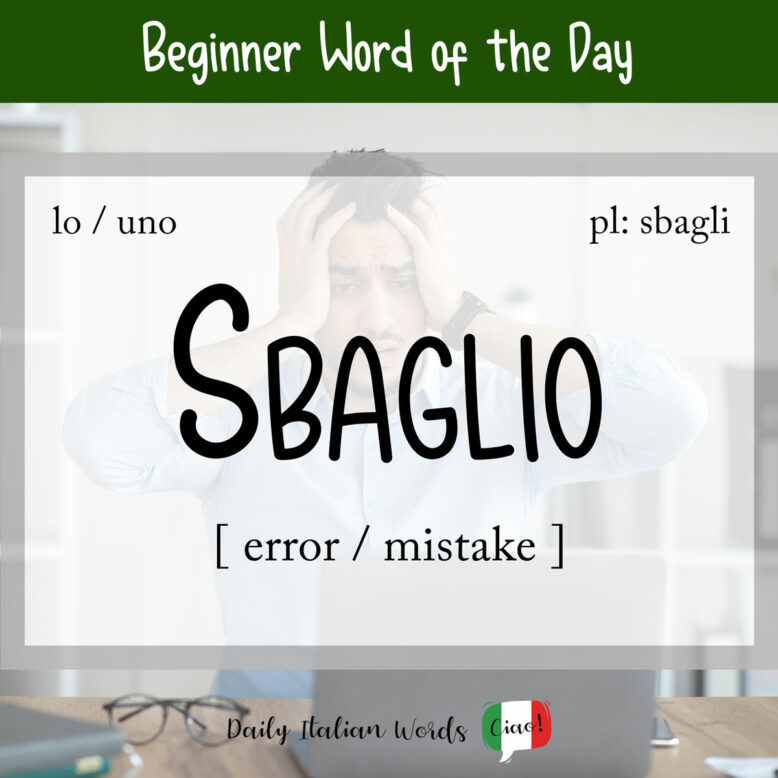The noun sbaglio in Italian, which means mistake or error, is a derivative of the verb sbagliare (to make a mistake), which itself is a combination of the subtractive prefix s- and abbagliare (to blind, to dazzle).

Sbaglio is a masculine noun, but because it starts with s + consonant, the definite and indefinite articles are as follows:
lo sbaglio = the mistake
uno sbaglio = a mistake
gli sbagli = the mistakes
degli sbagli = (some) mistakes
Although the verb sbagliare is perfectly legitimate, there are two alternative ways of saying “to make a mistake” in Italian that crop up in conversation quite a lot:
- fare uno sbaglio = to make a mistake
- commettere uno sbaglio = to make a mistake (lit. to commit an error), more serious than sbagliare / fare uno sbaglio
Da giovane, commisi uno sbaglio che cambiò per sempre la mia vita.
When I was young, I made a mistake that forever changed my life.
If you want to say it was a mistake, you can use the verb essere (to be) instead of fare (to do), just like in English.
È stato uno sbaglio venire qui.
It was a mistake to come here.

Sbaglio can also be used to explain a misunderstanding related to a person or thing. For example, uno sbaglio di persona means that a person has been mistaken for somebody else.
Per sbaglio is a frequently used expression that means by mistake.
Scusami, ho preso per sbaglio le tue chiavi.
Sorry, I took your keys by mistake.
The verb sbagliare can also be useful if you are looking for confirmation or reassurance. You can use the expression O sbaglio? (lit. Or mistake?) at the end of the phrase, which is a tag question that can equate to a number of English expressions, including but not limited to:
- Isn’t it? / Aren’t they?
- Am I wrong / mistaken?
- Isn’t he? / Isn’t she?
- Or what?
- Right?
- Isn’t there? / Aren’t there?
Questo letto è un po’ troppo piccolo, o sbaglio?
This bed is a bit on the small side, isn’t it?

Another way to express the same concept is with Ma sbaglio o… (lit. But mistake or…) placed at the beginning of the sentence. It mainly works in colloquial situations.
Ma sbaglio, o ci siamo già incontrati da qualche parte?
Am I wrong, or have we met somewhere before?
The longer form of these expressions is Correggimi se sbaglio ma… (informal) / Mi corregga se sbaglio ma… (formal) which means Correct me if I’m wrong but...
Correggimi se sbaglio ma, è il tuo compleanno oggi?
Correct me if I’m wrong but is it your birthday today?
The most common synonym for sbaglio is errore (error), and the two can be swapped in many of the example sentences above:
- È stato un errore venire qui. = It was a mistake to come here.
- Il tuo compito è pieno di errori. = Your homework assignment is full of mistakes.
- Scusami, ho preso per errore le tue chiavi. = Sorry, I took your keys by mistake.
Although the verb errare exist, you cannot use it in the place of sbagliare in the expressions o sbaglio? and Ma sbaglio….

Subsonica – Tutti i miei sbagli
The rock/electronic band Subsonica, originally from Torino, was one of the Italian groups my husband listened to during his youth. Here is one of their most popular songs that talks about mistakes.
Tu sai difendermi e farmi male
Ammazzarmi e ricominciare
A prendermi vivo
Sei tutti i miei sbagli
A caduta libera
in cerca di uno schianto
Ma fintanto che sei qui
posso dirmi vivo
Tu, affogando per respirare
Imparando anche a sanguinare
Nel giorno che sfugge
Il tempo reale sei tu
A difendermi e farmi male
Sezionare la notte e il cuore
Per sentirmi vivo
In tutti i miei sbagli
Non mi importa molto se
niente è uguale a prima
Le parole su di noi
si dissolvono cosi
Tu affogando per respirare
Imparando anche a sanguinare
Nel giorno che sfugge
Il tempo reale sei tu
A difendermi e farmi male
Sezionare la notte e il cuore
Per sentirmi vivo
In tutti i miei sbagli
Tu affogando per respirare
Imparando anche a sanguinare
Nel giorno che sfugge
Il tempo reale sei tu
Sai difendermi e farmi male
Sezionare la notte e il cuore
Per sentirmi vivo
In tutti i miei sbagli tu
Il mio orgoglio che può aspettare
E anche quando c’è più dolore
Non trovo un rimpianto
Non riesco ad arrendermi
A tutti i miei sbagli
Sei tutti i miei sbagli
Sei tutti i miei sbagli
Sei tutti i miei sbagli
You know how to defend me and hurt me
to kill me and start again
to take me alive
You are all my mistakes
In a free fall
searching for a crash
But as long as you are here
I can say I’m alive
You, drowining in order to breath
Also learning to bleed
In the day that slips away
The real time is you
In defending me and hurting me
To dissect the night and the heart
To feel alive
In all my mistakes
I don’t care a lot if
nothing is the same as before
The words about us
dissolve like that
You, drowining in order to breath
Also learning to bleed
In the day that slips away
The real time is you
In defending me and hurting me
To dissect the night and the heart
To feel alive
In all my mistakes
You, drowining in order to breath
Also learning to bleed
In the day that slips away
The real time is you
In defending me and hurting me
To dissect the night and the heart
To feel alive
In all my mistakes
My pride that can wait
And even when there is more pain
I don’t find a regret
I can’t surrender myself
to all my mistakes
You are all my mistakes
You are all my mistakes
You are all my mistakes
Heather Broster is a graduate with honours in linguistics from the University of Western Ontario. She is an aspiring polyglot, proficient in English and Italian, as well as Japanese, Welsh, and French to varying degrees of fluency. Originally from Toronto, Heather has resided in various countries, notably Italy for a period of six years. Her primary focus lies in the fields of language acquisition, education, and bilingual instruction.


